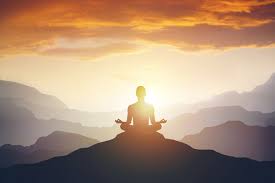|
There are two parts of our nervous system:
1. The sympathetic nervous system (our fight-or-flight response, involved in stress related activities) 2. The parasympathetic nervous system (our rest and digest functioning, keeps the body at rest and calm) We live in a world where there is a constant pressure to do more and be busy which can cause us to get stuck in the sympathetic (fight-or flight) dominant mode. Being stuck in fight-or-flight mode can manifest in symptoms such as: insomnia, overwhelm, anxiety, irritability, tired during the day but wired at night, and eventually depression (shutting down). When we're in a more parasympathetic nervous system state, we feel more calm, we sleep better, feel less stressed and experience greater wellbeing. So how we do tap back in into the parasympathetic nervous system? Here are some of my top 10 suggestions: 1. Meditation. Spending even a few minutes in meditation can restore calm and inner peace. Studies involving MRI scans show the amygdala (our part of the brain that deals with fear and anxiety) shrinks in response to a meditation practice. I personally find this the most effective method to bring me back into the parasympathetic. I love the Headspace and Calm Apps. Calm also has some great meditation videos on YouTube. Try to aim for 10 minutes in the morning, it can make such a difference in your day. 2. Prioritize Sleep. Our most restorative hours for sleep are between 10pm - 12am, when our brains make the most melatonin so optimal bedtime is around 10/10:30pm. Studies show 8 hours is the sweet spot for amount of sleep, and quality of sleep is incredibly important. This can be a hard one because stress can impact sleep quality, especially causing waking between 2 - 4 am; a common cortisol-related symptom. I will often suggest taking magnesium bisglycinate or calming herbs before bed if this is the case. 3. Calm Exercise. Avoid high intensity exercise and stick to gentler movements like yoga, pilates and walking. Intense exercise is a physical stress and the body doesn't differentiate between good stress and bad stress. 4. Decrease caffeine and alcohol intake, Increase water intake. Both alcohol and caffeine increase cortisol levels. Try to limit the coffee to 1/2 cup a day and keep alcohol to 2-3 drinks/week maximum. Being dehydrated has also shown to increase this stress hormone so aim for 2L of filtered water a day. 5. Say No to the things that don't serve you. Remove as much as you can from the to-do list and from your plans to simply your life. Really ask yourself what is essential and what will help you feel less stressed. Carving out more time for you, rest and self-care helps achieve this. 6. Hands-on Therapy - acupuncture, massage, osteopathic treatments are some examples of hands-on therapies that have been studied to calm our nervous systems. 7. Naturopathic Support - herbs, supplements and minerals are incredible in their ability to calm. Passionflower, ashwagandha, skullcap, theanine, glycine, and magnesium bisglycinate are some examples of naturopathic support that can reduce stress levels. Chat with your ND or book a consult here to see what would best suit you. 8. Warmth - taking a warm bath at the end of the day (or any time of day) has been shown to reduce cortisol levels and improve sleep quality. Tip - add lavender-infused epsom salts to the bath to make it extra relaxing. 9. Essential Oils - these can do wonders to calm our nervous systems down. Lavender is my best friend - it’s like a hug in a scent <3 10. Time in Nature - nature therapy, also known as eco therapy, has been shown to improve one’s stress levels and overall physical and mental health in numerous studies. ** Remember rest is productive! By tapping into our parasympathetic nervous system more often we truly become more productive and in line with what we truly want and value in our lives.
0 Comments
Leave a Reply. |
AuthorDr. Lara is a Naturopathic Doctor who is passionate about helping and empowering her patients in their journey towards lifelong health and wellness Categories
All
Archives
September 2021
|


